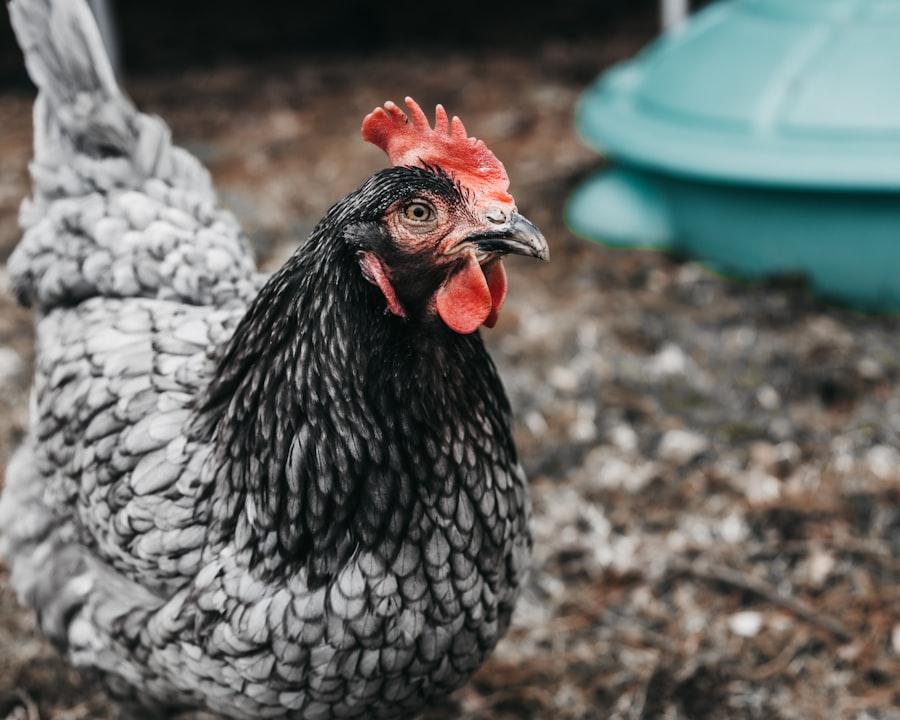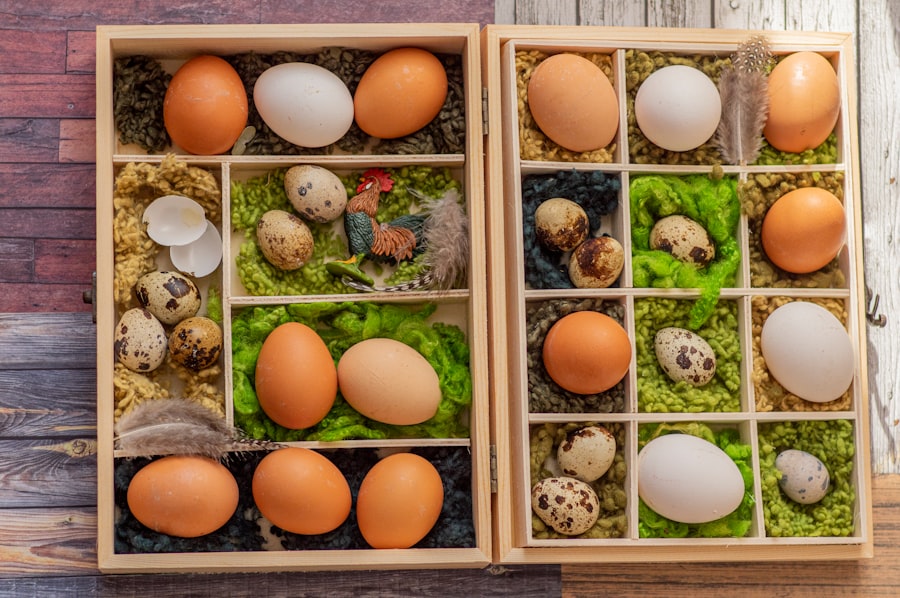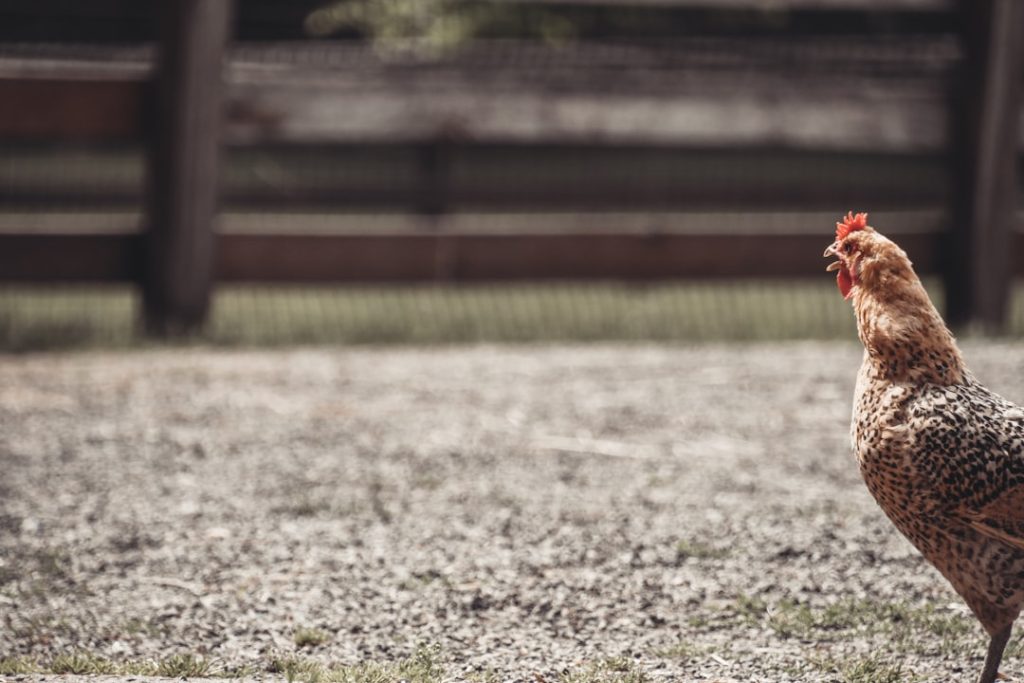Cats are natural predators with strong hunting instincts, characterized by their agility and speed. In contrast, chickens are prey animals that exhibit a natural fear of predators, including cats. Chickens are typically skittish and prone to stress, particularly when faced with potential threats.
A thorough understanding of both species’ behaviors is essential for creating a harmonious environment. Cats are known for their independence and territorial nature. They may view a chicken coop as an area to explore or a potential hunting ground.
It’s important to note that cats are not intentionally malicious towards chickens but are acting on their innate instincts. Chickens, being social animals, thrive in secure environments and rely on their flock for safety. They can become distressed when they perceive the presence of a predator, such as a cat.
By comprehending the behavioral patterns of both cats and chickens, one can implement proactive measures to ensure the safety and well-being of the chickens while simultaneously providing an appropriate environment for the cat.
Table of Contents
- 1 Creating a Safe and Secure Chicken Coop
- 2 Using Natural Deterrents to Keep Cats Away
- 3 Providing Enrichment for Cats to Distract Them from Chickens
- 4 Implementing Barriers to Prevent Cat Access to Chicken Areas
- 5 Training Your Cat to Stay Away from Chickens
- 6 Seeking Professional Help if Necessary
- 7 FAQs
- 7.1 What are some effective ways to keep cats away from chickens?
- 7.2 Why is it important to keep cats away from chickens?
- 7.3 Are there any natural deterrents that can be used to keep cats away from chickens?
- 7.4 What are some signs that a cat has been around the chicken coop?
- 7.5 Can keeping cats away from chickens help prevent the spread of diseases?
Key Takeaways
- Cats and chickens have different behaviors and understanding them is crucial for their coexistence.
- A safe and secure chicken coop is essential to protect chickens from predators, including cats.
- Natural deterrents such as citrus peels and coffee grounds can help keep cats away from chicken areas.
- Providing enrichment for cats, such as toys and scratching posts, can distract them from focusing on the chickens.
- Implementing barriers like fences and netting can prevent cats from accessing areas where the chickens are kept.
Creating a Safe and Secure Chicken Coop
Building a Predator-Proof Coop
Start by ensuring that the coop is well-constructed with sturdy materials that can withstand attempts by predators to gain access. Check for any gaps or openings that a cat could squeeze through and make sure to secure them.
Adding Extra Layers of Protection
Additionally, consider adding a wire mesh or hardware cloth around the coop to prevent cats from reaching through and grabbing a chicken. It’s also important to provide a secure outdoor run for your chickens to have access to fresh air and sunlight while still being protected from predators. Make sure the run is covered with a roof or wire mesh to prevent cats from jumping in.
Securing the Entrance
Adding a secure door with a latch that can’t be easily opened by a cat will further enhance the security of the coop. By creating a safe and secure chicken coop, you can minimize the risk of cat attacks and provide your chickens with a protected environment where they can thrive.
Using Natural Deterrents to Keep Cats Away

There are several natural deterrents that can be used to keep cats away from the chicken coop. One effective method is to plant cat-repelling plants around the perimeter of the coop. Plants such as lavender, rosemary, and lemon thyme are known to have strong scents that cats dislike, making them effective natural deterrents.
Additionally, spreading citrus peels or coffee grounds around the coop can also help deter cats, as they are known to dislike the smell of citrus and coffee. Another natural deterrent is to use motion-activated sprinklers around the coop. These devices are triggered by movement and emit a sudden burst of water, which can startle and deter cats from approaching the coop.
By using natural deterrents, you can create an environment that is less appealing to cats, reducing the likelihood of them targeting your chickens.
Providing Enrichment for Cats to Distract Them from Chickens
Providing enrichment for your cat can help distract them from focusing on the chickens as potential prey. Cats are natural hunters and need mental and physical stimulation to satisfy their hunting instincts. By providing toys, puzzle feeders, and interactive play sessions, you can redirect your cat’s energy towards more appropriate outlets.
Puzzle feeders can be filled with treats or kibble, encouraging your cat to “hunt” for their food and keeping them mentally engaged. In addition to toys and puzzle feeders, consider creating vertical spaces for your cat to climb and explore. Cats enjoy being up high and having vantage points to observe their surroundings.
Providing cat trees, shelves, or window perches can give your cat opportunities for climbing and exploring, which can help satisfy their natural instincts without directing their attention towards the chickens. By providing enrichment for your cat, you can help prevent boredom and reduce their focus on hunting behavior towards the chickens.
Implementing Barriers to Prevent Cat Access to Chicken Areas
Implementing barriers to prevent cat access to chicken areas is an effective way to protect your chickens from potential attacks. One option is to install a fence around the chicken coop and run area that is specifically designed to keep cats out. Use materials such as wire mesh or hardware cloth with small openings that cats cannot squeeze through.
Make sure the fence is tall enough to prevent cats from jumping over it. Another barrier option is to create a physical barrier around the coop using materials such as PVC piping or chicken wire. This barrier should be placed around the perimeter of the coop at a height that prevents cats from reaching through or climbing over it.
By implementing barriers to prevent cat access to chicken areas, you can create a secure environment for your chickens while minimizing the risk of cat attacks.
Training Your Cat to Stay Away from Chickens

Establishing Basic Obedience
Teaching your cat basic obedience commands is a crucial step in keeping them away from chickens. Start by teaching your cat to “sit,” “stay,” and “leave it.” These commands can be useful in redirecting your cat’s attention away from the chickens when needed. Use positive reinforcement techniques such as treats and praise to reward your cat for following commands and for exhibiting appropriate behavior around the chickens.
Using Deterrents
Another effective training method is to use deterrents such as noise or motion-activated devices when your cat approaches the chicken coop. For example, you can use a motion-activated alarm or ultrasonic deterrent that emits a loud noise or high-pitched sound when triggered by your cat’s presence near the coop. Over time, your cat may learn to associate these deterrents with approaching the chicken coop and will be less likely to do so in the future.
Consistency and Patience are Key
Remember that training your cat takes time and effort. Consistency and patience are essential in teaching your cat to stay away from chickens. With positive reinforcement and the use of deterrents, you can help your cat learn to coexist with your feathered friends.
Seeking Professional Help if Necessary
If you’re struggling to manage the behavior of your cat around your chickens, seeking professional help may be necessary. A certified animal behaviorist or veterinarian with experience in feline behavior can provide valuable insight and guidance on how to address the issue. They can assess your cat’s behavior and provide personalized recommendations for managing their interactions with the chickens.
Additionally, professional trainers who specialize in working with cats may offer training sessions or behavior modification programs tailored to your specific situation. These professionals can provide hands-on support and guidance in implementing training techniques and strategies to help modify your cat’s behavior around the chickens. In some cases, medication or pheromone therapy may be recommended by a veterinarian to help manage your cat’s predatory behavior towards the chickens.
Seeking professional help can provide you with the resources and expertise needed to effectively address the issue and create a safe environment for both your cat and chickens. In conclusion, understanding the behavior of both cats and chickens is essential in creating a harmonious environment where both species can coexist peacefully. By creating a safe and secure chicken coop, using natural deterrents, providing enrichment for cats, implementing barriers, training your cat, and seeking professional help if necessary, you can effectively manage the interactions between your cat and chickens while ensuring the safety and well-being of both animals.
With patience, consistency, and proactive measures, you can create a balanced environment where your cat and chickens can thrive together.
If you’re looking for more tips on keeping your chickens safe, you might want to check out this article on chicken coop door size. It’s important to make sure your coop is secure and properly sized to keep predators, including cats, away from your chickens. Additionally, you can also find more helpful information on poultry care and housing at poultrywizard.com. And if you’re considering adding guinea fowl to your flock, you can learn more about whether they can live with chickens in this article: can guinea fowl live with chickens.
FAQs
What are some effective ways to keep cats away from chickens?
Some effective ways to keep cats away from chickens include using physical barriers such as fences or netting, using motion-activated deterrents, and keeping the chicken feed and water in secure containers.
Why is it important to keep cats away from chickens?
It is important to keep cats away from chickens because cats are natural predators and may pose a threat to the safety and well-being of the chickens. Cats may also disturb the chickens and cause stress, which can affect their egg production and overall health.
Are there any natural deterrents that can be used to keep cats away from chickens?
Yes, there are natural deterrents that can be used to keep cats away from chickens. Some examples include planting cat-repelling plants such as lavender or rue, using citrus peels or essential oils, and spreading coffee grounds or cayenne pepper around the chicken coop.
What are some signs that a cat has been around the chicken coop?
Some signs that a cat has been around the chicken coop include paw prints in the dirt or mud, feathers scattered around the coop, and signs of disturbance in the chicken bedding or nesting areas.
Can keeping cats away from chickens help prevent the spread of diseases?
Yes, keeping cats away from chickens can help prevent the spread of diseases. Cats can carry and transmit diseases such as feline leukemia and feline immunodeficiency virus, which can be harmful to chickens. By keeping cats away from chickens, the risk of disease transmission can be reduced.
Meet Walter, the feathered-friend fanatic of Florida! Nestled in the sunshine state, Walter struts through life with his feathered companions, clucking his way to happiness. With a coop that’s fancier than a five-star hotel, he’s the Don Juan of the chicken world. When he’s not teaching his hens to do the cha-cha, you’ll find him in a heated debate with his prized rooster, Sir Clucks-a-Lot. Walter’s poultry passion is no yolk; he’s the sunny-side-up guy you never knew you needed in your flock of friends!







